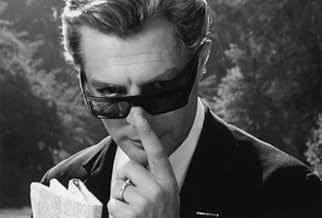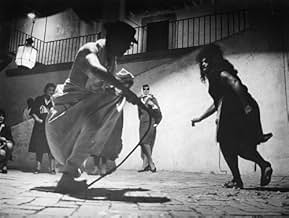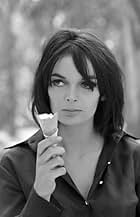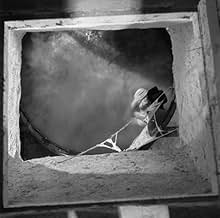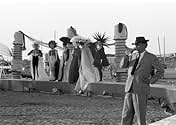Um diretor de cinema atormentado se retira para suas memórias e fantasias.Um diretor de cinema atormentado se retira para suas memórias e fantasias.Um diretor de cinema atormentado se retira para suas memórias e fantasias.
- Direção
- Roteiristas
- Artistas
- Ganhou 2 Oscars
- 19 vitórias e 9 indicações no total
Anouk Aimée
- Luisa Anselmi
- (as Anouk Aimee)
Eddra Gale
- La Saraghina
- (as Edra Gale)
Avaliações em destaque
Fellini's films is one of the main reasons I came to love movies in the first place. I first saw 8 1/2 several years ago. I remember it quite clearly: I went to see it with a small group of fellow students at a friend's house. It was at the beginning of a now already long-since destroyed relationship. It was a cold day in early January. As the film started, a girl who was there, who happened to be a make-up artist and hairdresser by profession, remarked on the odd juxtaposition in the opening scenes of hair-styles and dresses from different eras, the 30's and the 60's. Surely, this was a strange anachrony?
My friend calmly remarked: "Time doesn't exist."
Heck, I won't pretend to know just what he meant by that, perhaps it wasn't as profound as it sounded. In any case, after that, no one spoke. For the next couple of hours, I certainly lost track of place and time, as I was hypnotized, mesmerized and amazed by the images on the screen. Since then, I've always kept a copy of it within reach (even though I am one of those people who can usually never hang on to my possessions for any length of time), and it has lost none of its power to continually amaze me. I've seen it more times than I can count, and yet, it must always be seen again. It's a movie about which everything seems to have been said, and yet, everything still remains to be said. Thanks to the wonders of DVDs and MPEG encoding, I can keep it one mouse-click away whenever I'm working on my computer. I must admit that by now, its already from the outset discontinuous and jumbled content has been spread all over the place for me. Unlike Woody Allen, I'm not anal. I've never had a compulsion to have to watch movies straight from beginning to end, without interruptions. Of course, that's how I watched 8 1/2 the first few times, but now it seems that I'm always chopping it up, skipping at will between my favorite sections, always moving around it and rearranging it in new and unexpected ways. I hope Fellini, in his Heaven, forgives me for it, because it seems to me that I'm in a way just continuing what he began. 8 1/2, even in its purest state, does of course blow the traditional temporal narrative, with a defined beginning, middle and end and a causal relationship between its parts, to complete smithereens, and in the jumbled landscape that is left behind, nothing can ever be as it was before, as what we are left with is a completely new world, of new possibilities and new kinds of beauty. It's a story of dream-logic, held together by different kinds of connections that transcend temporal sequence and causal relationships. It's a film that never begins, and still has always been there.
It's a movie about the most glorious success that can only be brought around through complete failure. It's about how we can only find ourselves when we let go of ourselves - and discover that the only place we can fall is into ourselves, our true selves. It's the ultimate self-referential masterpiece, and the ultimate piece of self-reference, as it is, of course, about nothing except itself.
It really is, in my opinion, the best movie in the world, and by now I can't even imagine a world without it. That's really all I want to say.
My friend calmly remarked: "Time doesn't exist."
Heck, I won't pretend to know just what he meant by that, perhaps it wasn't as profound as it sounded. In any case, after that, no one spoke. For the next couple of hours, I certainly lost track of place and time, as I was hypnotized, mesmerized and amazed by the images on the screen. Since then, I've always kept a copy of it within reach (even though I am one of those people who can usually never hang on to my possessions for any length of time), and it has lost none of its power to continually amaze me. I've seen it more times than I can count, and yet, it must always be seen again. It's a movie about which everything seems to have been said, and yet, everything still remains to be said. Thanks to the wonders of DVDs and MPEG encoding, I can keep it one mouse-click away whenever I'm working on my computer. I must admit that by now, its already from the outset discontinuous and jumbled content has been spread all over the place for me. Unlike Woody Allen, I'm not anal. I've never had a compulsion to have to watch movies straight from beginning to end, without interruptions. Of course, that's how I watched 8 1/2 the first few times, but now it seems that I'm always chopping it up, skipping at will between my favorite sections, always moving around it and rearranging it in new and unexpected ways. I hope Fellini, in his Heaven, forgives me for it, because it seems to me that I'm in a way just continuing what he began. 8 1/2, even in its purest state, does of course blow the traditional temporal narrative, with a defined beginning, middle and end and a causal relationship between its parts, to complete smithereens, and in the jumbled landscape that is left behind, nothing can ever be as it was before, as what we are left with is a completely new world, of new possibilities and new kinds of beauty. It's a story of dream-logic, held together by different kinds of connections that transcend temporal sequence and causal relationships. It's a film that never begins, and still has always been there.
It's a movie about the most glorious success that can only be brought around through complete failure. It's about how we can only find ourselves when we let go of ourselves - and discover that the only place we can fall is into ourselves, our true selves. It's the ultimate self-referential masterpiece, and the ultimate piece of self-reference, as it is, of course, about nothing except itself.
It really is, in my opinion, the best movie in the world, and by now I can't even imagine a world without it. That's really all I want to say.
Fellini's 8 1/2 opens with a stunning dream sequence in which a man is trapped in his car in the middle of a traffic jam. The doors and windows are locked and there is no escape. Other drivers simply sit and stare at him passively. The driver starts to panic as smoke begins to build up within the car. Propelling himself outside a window, he floats over the other cars and soars above the world until he is pulled down a rope attached to a tether on his ankle. The driver is Guido Anselmi (Marcello Mastroianni), a film director at odds with himself. Shot in black and white, 8 1/2 is an exhilarating, confusing, irritating, and inspired journey into a man's consciousness. It is not just a look at the inner turmoil of one person, but also a commentary on each person's struggle to make sense of their life. The film's combination of kaleidoscopic images, evocative score by Nino Rota, and amazing performances ensure its place as one of the greatest films of the century.
Guido is preparing to shoot a new film with an expensive budget. He constructs a huge spaceship launch pad that costs $80 million but he is unsure of what he wants to say. Guido's dishonesty in dealing with his marriage, his career, and the fact that he really does not want to make the film forces him to falsely mislead people as to his true intentions. He feels like a failure and is physically spent. He checks into a spa to restore his health and well being but the contingent of producers, actors, writers, and hangers on undermine his strength. His feeling of being overwhelmed by personal and professional obligations provides the catalyst for dreams and fantasies that take him back to his childhood.
Fellini shows his encounter with the prostitute Saraghina (Eddra Gale) and the guilt he has to deal with in a confrontation with the Catholic Church. Guido invites his intellectual wife Luisa (Anouk Aimée) to the set but their relationship has turned cold and passionless, and sparks fly when she has to confront Carla (Sandra Milo), his buxom mistress. Guido is misguided but he has an innocence and charm that allows us to overlook his indulgences. He enjoys his pleasures but has a conscience and feels guilty about cheating on Luisa whom he loves and is afraid of losing. He fantasizes that all of the women in his life are together in a harem where they all dote on his every whim. When they finally recognize how little he cares about them, he is forced to suppress their revolt.
As image piles on image and the fantasy becomes indistinguishable from the reality, the viewer may get lost in a maze of dazzling incoherence. Fellini, however, always returns to solid ground and the film offers not only a satire on the frenzy, the uncertainty, and the clash of egos involved with making a film but also a serious commentary on the importance of honesty in a relationship. If 8 1/2 is occasionally exhausting, the ending is invigorating, letting us know that life is a game in which each of us is on the stage performing our roles and the only sane response to its turmoil is to join hands in love and celebrate the moment.
Guido is preparing to shoot a new film with an expensive budget. He constructs a huge spaceship launch pad that costs $80 million but he is unsure of what he wants to say. Guido's dishonesty in dealing with his marriage, his career, and the fact that he really does not want to make the film forces him to falsely mislead people as to his true intentions. He feels like a failure and is physically spent. He checks into a spa to restore his health and well being but the contingent of producers, actors, writers, and hangers on undermine his strength. His feeling of being overwhelmed by personal and professional obligations provides the catalyst for dreams and fantasies that take him back to his childhood.
Fellini shows his encounter with the prostitute Saraghina (Eddra Gale) and the guilt he has to deal with in a confrontation with the Catholic Church. Guido invites his intellectual wife Luisa (Anouk Aimée) to the set but their relationship has turned cold and passionless, and sparks fly when she has to confront Carla (Sandra Milo), his buxom mistress. Guido is misguided but he has an innocence and charm that allows us to overlook his indulgences. He enjoys his pleasures but has a conscience and feels guilty about cheating on Luisa whom he loves and is afraid of losing. He fantasizes that all of the women in his life are together in a harem where they all dote on his every whim. When they finally recognize how little he cares about them, he is forced to suppress their revolt.
As image piles on image and the fantasy becomes indistinguishable from the reality, the viewer may get lost in a maze of dazzling incoherence. Fellini, however, always returns to solid ground and the film offers not only a satire on the frenzy, the uncertainty, and the clash of egos involved with making a film but also a serious commentary on the importance of honesty in a relationship. If 8 1/2 is occasionally exhausting, the ending is invigorating, letting us know that life is a game in which each of us is on the stage performing our roles and the only sane response to its turmoil is to join hands in love and celebrate the moment.
I know this film is loved and admired by countless filmmakers and fans. I know that the film is very artistic and wonderfully well made. And I understand that all serious lovers of film SHOULD see this film. But, despite this being a "must-see" film, I didn't particularly enjoy it--but I do respect what Fellini was trying to do. For the first time, Fellini was able to capture on film the psyche and inner turmoil of a director and although the film stars Marcello Mastroianni, the film is in many, many ways autobiographical. His inner struggles with traditional morality and god, sexuality and loyalty, all the sycophants trying to get his attention and the critic as well as his own childhood (including, of course his mother AND a representation of early sexual awakening in the form of a hideous but very sexual lady who looked a lot like Divine!) all come together in a series of somewhat disconnected images. All these factors that together work together to make the director's psyche are interesting, but very surreal--like the entire film is a dream or something that is the result of drugs. It is interesting at times, but also very tiring and difficult to watch at times and occasionally a bit dull. That's because it's a very choppy movie and only a child who is very hyperactive could easily stick with the ever-changing plot. As for me, what I liked best was the opening dream sequence--it was very amusing and brilliant.
This type of self-analysis and parody was often copied in such films as STARDUST MEMORIES (to me, a blatant attempt by Woody Allen to steal or re-created 8 1/2) or DAY FOR NIGHT--though Truffaut's vision is much, much more conventional and lacks the surrealism and weirdness of Fellini. Many prefer Fellini's mad style, but as for me, while it is not as original or wildly innovative, DAY FOR NIGHT was a more enjoyable film.
Overall, while not a fun or completely comprehensible film, it's a must for anyone who considers themselves a serious fan of film.
This type of self-analysis and parody was often copied in such films as STARDUST MEMORIES (to me, a blatant attempt by Woody Allen to steal or re-created 8 1/2) or DAY FOR NIGHT--though Truffaut's vision is much, much more conventional and lacks the surrealism and weirdness of Fellini. Many prefer Fellini's mad style, but as for me, while it is not as original or wildly innovative, DAY FOR NIGHT was a more enjoyable film.
Overall, while not a fun or completely comprehensible film, it's a must for anyone who considers themselves a serious fan of film.
Intellectuals have written volumes on this strange film by Italian New Wave director, Federico Fellini. I am not an intellectual, so my review will be brief. At its most basic, "8 1/2" (a.k.a. "Otto e mezzo") concerns Guido, a film director (supposedly a surrogate for Fellini himself), who is having what amounts to a midlife crisis. Guido is frustrated in his film-making, and by his relations with other people in his life. But the film's story does not proceed in a traditional, linear fashion. Fellini more or less abandons logical narration, in favor of "open form" narration, wherein the story's causal chain of events is broken.
Thus, trying to figure out what is going on in this film can be hard. Guido's fantasies, memories, dreams, and reality co-mingle in a kind of cinematic stew. Fellini presents viewers with a kaleidoscope of surreal B&W images of ordinary objects and eccentric, chattering characters which interact with Guido and with each other, in ways that defy logic, and give breathtaking meaning to the term symbolism. Followers of psychologist Carl Jung would have a field day. In style, the film is flamboyant. In substance, the film is maddeningly subliminal. And yet, even the most metallic cynic, Pauline Kael notwithstanding, must surely appreciate the rareness of Fellini's probing introspection.
Given the bizarre, unstructured content of "8 1/2", I wonder about the issue of necessity. Suppose Fellini had added an extra ten minutes to the screenplay, or deleted ten minutes. Would that have made any difference? Apart from Guido, if this or that character had been deleted, how would that have changed the story's significance? And if, as some have suggested, the film is a mirror image of Fellini's own confused psyche, can the story be construed as an intuition of his future film-making?
"Otto e mezzo" is not for everyone. Like a Zen koan, "8 1/2" invites frustration. It is above all else a celebration of ambiguity and abstraction, a cinematic experience to ponder, especially on the heels of four or five martinis ... or 8 1/2, if you really want to induce immense intellectual insight. Cheers.
Thus, trying to figure out what is going on in this film can be hard. Guido's fantasies, memories, dreams, and reality co-mingle in a kind of cinematic stew. Fellini presents viewers with a kaleidoscope of surreal B&W images of ordinary objects and eccentric, chattering characters which interact with Guido and with each other, in ways that defy logic, and give breathtaking meaning to the term symbolism. Followers of psychologist Carl Jung would have a field day. In style, the film is flamboyant. In substance, the film is maddeningly subliminal. And yet, even the most metallic cynic, Pauline Kael notwithstanding, must surely appreciate the rareness of Fellini's probing introspection.
Given the bizarre, unstructured content of "8 1/2", I wonder about the issue of necessity. Suppose Fellini had added an extra ten minutes to the screenplay, or deleted ten minutes. Would that have made any difference? Apart from Guido, if this or that character had been deleted, how would that have changed the story's significance? And if, as some have suggested, the film is a mirror image of Fellini's own confused psyche, can the story be construed as an intuition of his future film-making?
"Otto e mezzo" is not for everyone. Like a Zen koan, "8 1/2" invites frustration. It is above all else a celebration of ambiguity and abstraction, a cinematic experience to ponder, especially on the heels of four or five martinis ... or 8 1/2, if you really want to induce immense intellectual insight. Cheers.
What can anyone say about this film? It's one of a kind, and simple words can't really describe it.
The famous Italian director Federico Fellini presents us the journey of the highly surrealistic thoughts of a filmmaker, who suffers from, what we could call, Director's block. The protagonist, who seems constantly tired, is surrounded by many different people, friends, associates, priests and mostly... women; struggling with his weird fantasies of the current events of his life and memories of his childhood. All of these scenes take place in many different phantasmagoric sets, where multiple, for the most part random, conversations occur simultaneously, making him continually engaged and, in a way, frustrated.
The production design is exceptional, with huge sets and dreamlike settings, while the cinematography (Fellini's last black and white film) is very unique and teases the viewer with alternate focusing and artsy compositions. The music theme is for the most part classical symphonies from Tchaikovsky, Wagner and Chopin, beautifully edited with the rhythm of the film.
This is a drama with many subtle doses of comedy and a surreal analysis of the thoughts, relationships, affairs, fears, dreams and memories of the protagonist. Some viewers can find a bit annoying the randomness of the script and editing, where mostly unexplained things occur, but others can completely immerse in this insane trip and fully enjoy it.
If you've seen some movies of Charlie Kaufman, a good explanation of what to expect is a wedding between Adaptation and Synecdoche, New York. If you haven't seen any of those, then you can go ahead and experience something you've never had before!
The famous Italian director Federico Fellini presents us the journey of the highly surrealistic thoughts of a filmmaker, who suffers from, what we could call, Director's block. The protagonist, who seems constantly tired, is surrounded by many different people, friends, associates, priests and mostly... women; struggling with his weird fantasies of the current events of his life and memories of his childhood. All of these scenes take place in many different phantasmagoric sets, where multiple, for the most part random, conversations occur simultaneously, making him continually engaged and, in a way, frustrated.
The production design is exceptional, with huge sets and dreamlike settings, while the cinematography (Fellini's last black and white film) is very unique and teases the viewer with alternate focusing and artsy compositions. The music theme is for the most part classical symphonies from Tchaikovsky, Wagner and Chopin, beautifully edited with the rhythm of the film.
This is a drama with many subtle doses of comedy and a surreal analysis of the thoughts, relationships, affairs, fears, dreams and memories of the protagonist. Some viewers can find a bit annoying the randomness of the script and editing, where mostly unexplained things occur, but others can completely immerse in this insane trip and fully enjoy it.
If you've seen some movies of Charlie Kaufman, a good explanation of what to expect is a wedding between Adaptation and Synecdoche, New York. If you haven't seen any of those, then you can go ahead and experience something you've never had before!
Você sabia?
- Curiosidades8½ (1963) was shot, like almost all Italian movies at the time, completely without sound recording on set. All dialogue was dubbed during post production. Federico Fellini was known for shouting direction at his actors during shooting, and for rewriting dialogue afterwards, making a lot of the dialogue in the movie appear out-of-sync. (Source: High-def Digest)
- Erros de gravaçãoWhen Guido visits the cardinal in the mud bath, the cardinal is sitting in a chair, fully dressed in his cassock, as two attendants use a sheet to form a curtain around him; however, as the camera cuts to a closer angle, the cardinal is suddenly undressed to the waist.
- Citações
Claudia: I don't understand. He meets a girl that can give him a new life and he pushes her away?
Guido: Because he no longer believes in it.
Claudia: Because he doesn't know how to love.
Guido: Because it isn't true that a woman can change a man.
Claudia: Because he doesn't know how to love.
Guido: And above all because I don't feel like telling another pile of lies.
Claudia: Because he doesn't know how to love.
- Versões alternativasIn the American theatrical release version, Rodgers & Hart's "Blue Moon" can be heard twice: the first time, when it's played by strolling strings near the shopping plaza where Guido meets up with his wife, Luisa; the second time, when Guido goes out for a drive with the "real" Claudia. However, in the original Italian release, the song played in both scenes is "Sheik of Araby." The Criterion laserdisc features "Blue Moon," but it's "Sheik of Araby" on the DVD, possibly due to the use of different source materials.
- ConexõesEdited into Bellissimo: Immagini del cinema italiano (1985)
Principais escolhas
Faça login para avaliar e ver a lista de recomendações personalizadas
Detalhes
- Data de lançamento
- Países de origem
- Centrais de atendimento oficiais
- Idiomas
- Também conhecido como
- Federico Fellini's 8½
- Locações de filme
- Tivoli, Roma, Lazio, Itália(location)
- Empresas de produção
- Consulte mais créditos da empresa na IMDbPro
Bilheteria
- Faturamento bruto nos EUA e Canadá
- US$ 245.681
- Fim de semana de estreia nos EUA e Canadá
- US$ 11.947
- 11 de abr. de 1999
- Faturamento bruto mundial
- US$ 347.423
- Tempo de duração2 horas 18 minutos
- Cor
- Mixagem de som
- Proporção
- 1.85 : 1
Contribua para esta página
Sugerir uma alteração ou adicionar conteúdo ausente





